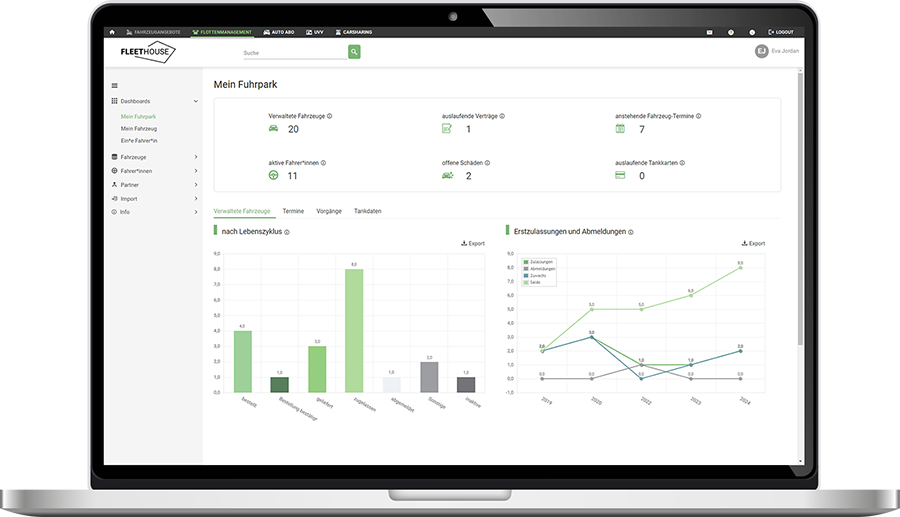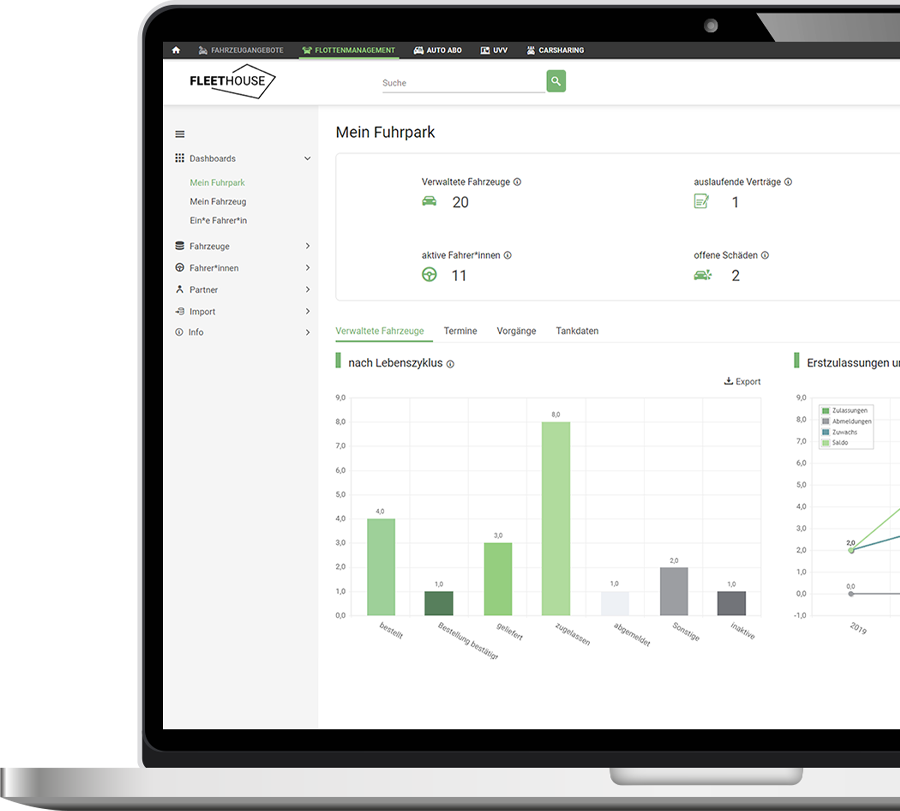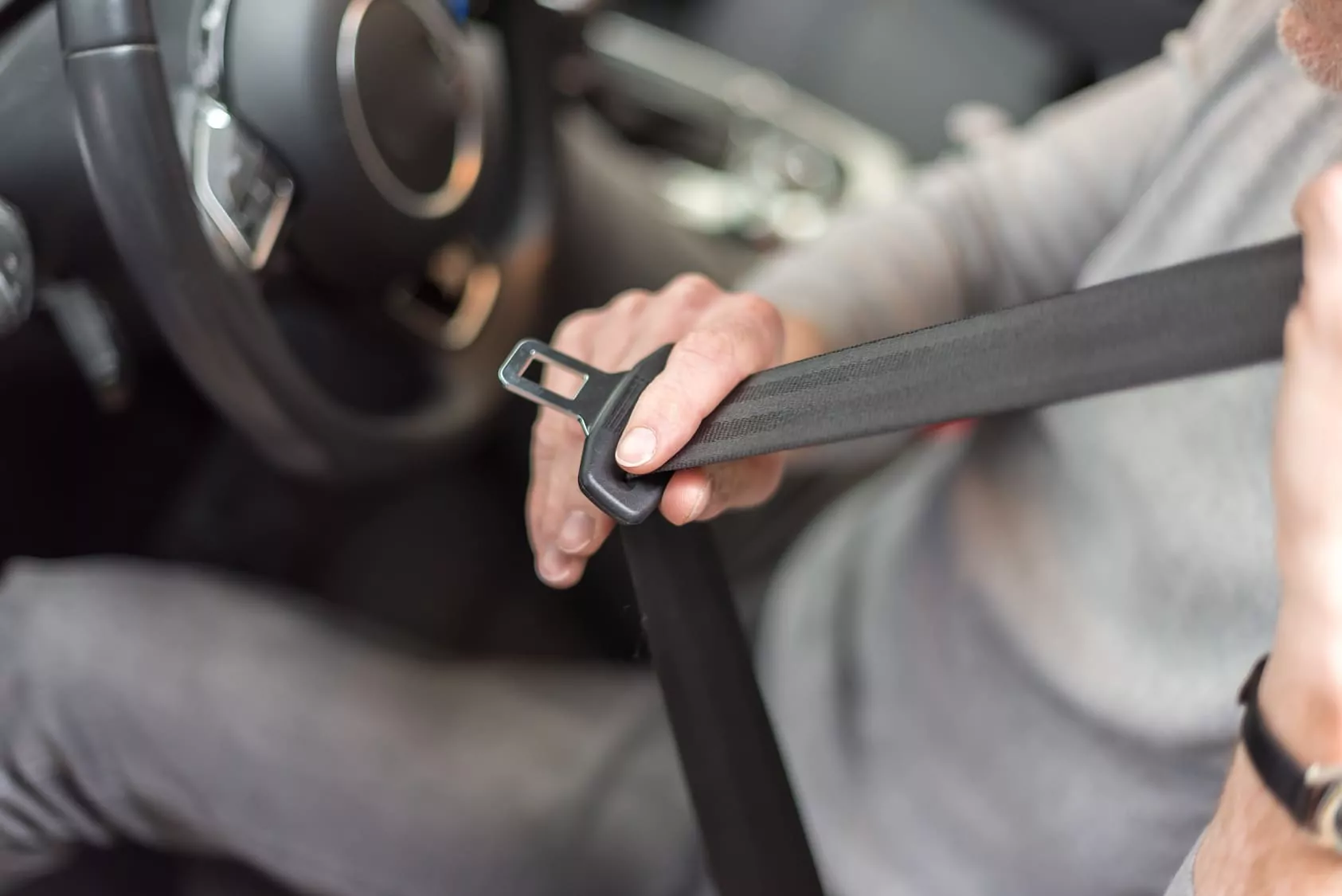Regular accident prevention training for all drivers in the fleet is a statutory requirement and an important part of vehicle management. After all, anyone who provides their employees with company vehicles must also train them in the safe handling of the vehicles. In our blog, we look at the most important aspects of UVV instruction and give you an overview of the consequences of non-compliance. We also offer you a sample template for UVV driver training as a PDF for download.
Contents
What is UVV instruction?
Company vehicles are work equipment and can endanger safety if used improperly. For this reason, driver training in accordance with UVV(accident prevention regulations) for company cars is part of the owner’s liability obligations and occupational safety and is prescribed by law.
Regular instruction is provided to train drivers in the safe handling of vehicles and how to behave in the event of accidents. This should minimize the risk in the fleet and for all drivers. Adequate driver training in accordance with the UVV should take place at least once a year.
What is the legal basis?
The need for annual UVV training is enshrined in the law in several places:
- § Section 12 of the Occupational Health and Safety Act open_in_new (ArbSchG ) states that employers must instruct their employees on health and safety in the workplace.
- § Section 12 of the German Ordinance on Industrial Safety and Health open_in_new (BetrSichV) and Section 4 of DGVU Regulation 1 stipulate that employees must be properly instructed once a year before using work equipment for the first time.
- This is supplemented in the vehicle fleet by § 35 DGUV regulation 70 open_in_new . The paragraph stipulates that employees may only be entrusted with driving the vehicle after receiving appropriate driver training.
The DGUV is the accident prevention regulation of the German Social Accident Insurance, which specifies the handling of vehicles in the company. If the company car is replaced during the year, additional training is required.
From the legal basis to the most important obligations – find out more about the topic of keeper liability in our free guide: Keeper liability in the vehicle fleet
Who is responsible for carrying out the UVV driver training?
In general, the employer or the management is responsible for carrying out the UVV instruction, but can also transfer this duty to other persons in the company. This is usually the person responsible for the vehicle fleet.
If you, as a fleet manager, are responsible for the proper implementation of the UVV driver training, you are also responsible for documenting all instructions in addition to organizing and conducting the training. This plays a fundamental role, especially in the event of a claim.

Digitize your Fleet with Fleethouse
Register with Fleethouse and test the functions of the fleet management software free of charge for 30 days.
How is driver training carried out in accordance with the UVV?
Fleet managers can carry out the annual UVV training as face-to-face training or electronically.
Classroom training
The organization and implementation of a face-to-face event is usually time-consuming and expensive. You have to plan dates and organize suitable rooms. Added to this is the coordination of participants and, last but not least, fleet managers have to prepare the training content in a technically correct manner.
Electronic instruction
Electronic accident prevention instruction is much more convenient – for both fleet management and drivers. With driver instruction as an e-learning courselike the one from Fleethouse, you can instruct drivers flexibly, whether they are in the office, at home or on the road. The Training content is already fully developed and immediately available. The software also takes care of communication with the drivers for you and automatically sends invitations to the course. Each UVV instruction course carried out is then Fully documented.
If you would like to find out more about the advantages of an e-learning course, we recommend our article“5 advantages of electronic driver training“.

What are the consequences of failing to comply with driver training in accordance with the UVV?
It is essential that you comply with your duty to instruct. If you fail to do so, there may be serious consequences in the event of an accident. The severity of the injuries caused by the accident is irrelevant.
Not only companies risk severe fines, fleet managers can also be held personally liable. Fines of up to 10,000 euros may be imposed. In addition, statutory accident insurance does not cover damage to health or life. The employers’ liability insurance association can even reclaim the payments made if the employer has intentionally or grossly negligently disregarded its obligations.
If the UVV instruction for company cars has been delegated to a person who is not professionally or personally suitable for the task, this constitutes negligence in selection or supervision. In this case, you could even face a fine of up to 1 million euros or a prison sentence.
To stay on the safe side, you should not make any compromises when implementing the UVV instruction. Fulfill your fleet management obligations in good time and avoid unpleasant consequences for yourself and your company.
What does UVV driver training involve?
To support employers and fleet managers in carrying out the UVV driver instruction, there are templates for the instruction in PDF format. The content may vary depending on the vehicle and area of use and must be adapted individually depending on the requirements and hazards in the fleet. We will show you the components of a training course that fleet management should always take into account:
- Operation of the vehicle: Drivers receive instruction on the correct operation of the vehicle, including the controls, instruments and safety equipment. The handling of electric vehicles must also be dealt with separately, as electrically powered vehicles have different control and safety features than company cars with diesel engines, for example.
- Security: This section is dedicated to road safety and how to behave in various traffic situations and in the event of accidents or traffic jams. This also includes the use of seat belts, the correct seating position and the correct behavior in emergencies. Load securing also plays an important role when luggage or other cargo needs to be transported.
- Traffic rules: Drivers must be informed about the applicable traffic rules and road regulations. This also includes right of way and distance rules, speed limits and rules for overtaking.
- Maintenance and care: The driver instruction contains instructions on how to carry out maintenance and care of the vehicle, including checking tire pressure, oil level and brakes.
Download UVV driver instruction template
Laden Sie sich hier unsere kostenfreie Vorlage für die Fahrerunterweisung nach UVV herunter.
"*" indicates required fields
Conclusion for driver instruction according to UVV
A safe vehicle fleet is of great importance for every company. One of the most important obligations here is the annual accident prevention training of employees in accordance with the accident prevention regulations (UVV). DGUV Regulation 70 lays down the rules for safety in the workplace (as in cars) in the vehicle fleet and regulates all essential topics that are important for the operational use of vehicles.
Under no circumstances should the implementation of UVV instruction for company cars be taken lightly, as companies and fleet managers may face severe penalties. Instruction via an e-learning course requires little effort and employees can be tested at any time and from any location.
Don't miss any dates
Fleethouse reminds you of important dates in your fleet for just €2.90 a month per vehicle.

FAQ - Instruction according to UVV
The UVV instruction must be carried out at least once a year and before every first journey. If there is a change of vehicle within the year, a new UVV instruction is required.
All employees who use a company car in the company must take part in accident prevention training. Regardless of whether they drive a company car regularly or only occasionally. If the employee uses their private vehicle for business purposes, this is not covered by the regulation.
The content of an instruction depends on the individual requirements and circumstances of the vehicle fleet. In principle, the following aspects should be considered in an accident prevention instruction for company cars: Traffic rules and regulations, safety equipment, vehicle inspection and maintenance as well as what to do in the event of an accident.
UVV training via e-learning offers numerous advantages. These include time and location independence, which enables participants to complete the training at any time and from anywhere. This increases flexibility and cost efficiency, as there are no travel and accommodation costs. In addition, electronic driver training relieves the burden on fleet managers, as invitations are sent out automatically and the content is already prepared. The results are stored in a traceable manner, which makes it easier to comply with legal regulations and internal standards.
The most important information on driver training according to UVV at a glance
Driver instruction in accordance with the UVV is one of the most important owner liability obligations and is enshrined in law.
Regular instruction (at least once a year) in accordance with the accident prevention regulations ensures that employees are trained in the safe handling of vehicles.
Failure to comply with the UVV can have serious consequences: severe fines and even imprisonment.
Further Fleet Knowledge
If you liked this article and would like to know more about this topic, we recommend these articles.

Fleet management without Excel: How to save time and money

5 advantages of an UVV e-learning course for your fleet

Owner liability in the fleet: aspects for fleet managers
Further blog articles on the topic of fleet management
The vehicle fleet at a glance: Importance, trends and technologies
Fleet management without Excel: How to save time and money
Basic areas of fleet management
Fleet management: basics and helpful tips
Measures for sustainable fleet management
Owner liability in the fleet: what fleet managers should bear in mind



